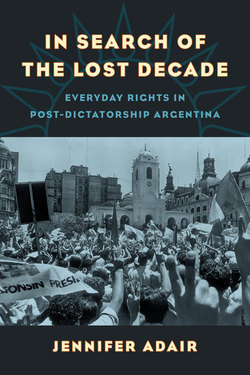In Search of the Lost Decade

Реклама. ООО «ЛитРес», ИНН: 7719571260.
Оглавление
Jennifer Adair. In Search of the Lost Decade
Отрывок из книги
In Search of the Lost Decade
Everyday Rights in Post-Dictatorship Argentina
.....
By the late 1970s, the regime had murdered thousands and sent many more into exile or hiding. Yet from the depths of this loss and fear emerged Argentina’s contemporary human rights movement, one of the most vocal forces to resist the regime. The Mothers and Grandmothers of the Plaza de Mayo are perhaps the most well-known organizations founded in the face of state terror, recognizable the world over by their iconic white headscarves and their tireless searches for their disappeared children and grandchildren. They joined a growing number of organizations made up of public figures, victims’ family members, survivors, religious leaders, and jurists, among others, who worked to denounce the regime and its crimes and to forge links with transnational solidarity networks. Their efforts to promote the defense of human rights—defined primarily at first as protection of the body from state violence—would shape public life and debate in the decades to come. The movement also helped solidify the maxim that any future democratic government must protect the physical well-being of its citizens from state abuse, an idea later adapted by the Alfonsín government in the 1980s.
Latin America’s Cold War dictatorships relied on terror to initiate radical economic transitions to neoliberalism. In Argentina, the regime and its civilian allies in the financial sector attempted to reverse several decades of import substitution industrialization (ISI) policies, which they blamed for endemic instability and political crisis. Among other measures, neoliberal boosters advocated for a retreat of the state, deregulation, and friendly conditions for foreign capital investment. Unlike in neighboring Chile, where the dictatorship of Augusto Pinochet inaugurated a wide-reaching era of free-market reforms, the Argentine junta did not fully realize its economic plan. But it did sufficiently begin to chip away at some of the foundations of mid-twentieth-century economic planning, concentrating wealth in a few domestic firms and weakening labor rights and other social protections in the process. These and other measures sparked a decade-long recession and an extended economic crisis, which shaped the parameters of governability for the rest of the century.
.....